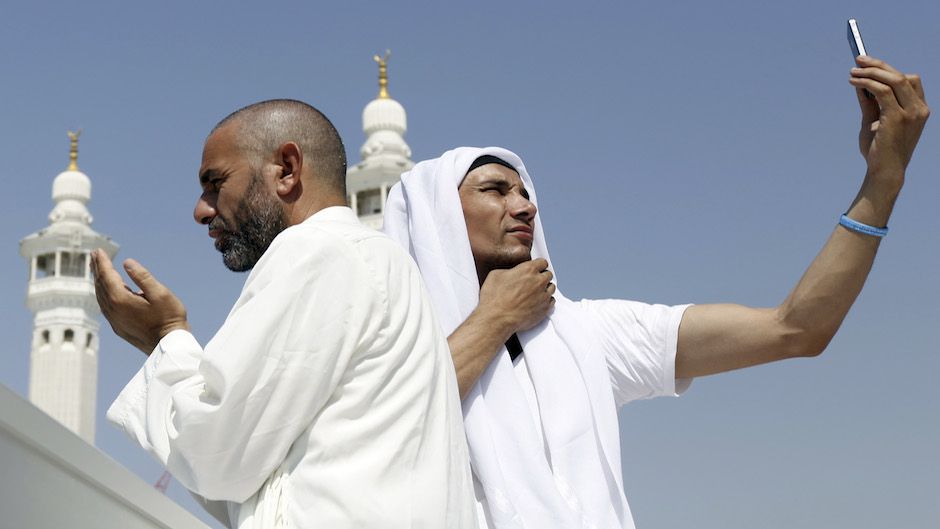How Selfies and Wearables Are Transforming Hajj

EghtesadOnline: Lost in Mecca, Tarek AlZubair wandered around Islam’s holy city for 15 minutes a few months ago. He couldn’t find a designated area to carry out ritual washings required before prayer.
The information online was either nonexistent or incomplete. “I thought to myself: why can’t there be a better method?” said AlZubair, 25. So he raced to develop an app, released Wednesday, that acts as a field guide to Hajj, which starts this week, according to Bloomberg.
Technology is transforming the thousand-plus-year-old ritual in ways that are making Islam’s traditions more accessible while also sometimes confounding traditionalists, who abhor selfies.
High-tech advances are taking on more importance following last year’s stampede that killed at least 769 people. The Saudi government has said it is creating wristbands that can help identify and guide pilgrims, part of a “digital transformation” to improve services.
More than a million people have flown into Saudi Arabia so far to perform Hajj, an annual pilgrimage that starts this week. Every Muslim who can make the journey is required to do so at least once in his or her lifetime.
AlZubair’s app, Wajibati - Hajj and Umrah, is one of several geared towards pilgrims. It features a step-by-step guide for Hajj and Umrah—a lesser pilgrimage that can be taken any time of year—emergency contacts, a map of Mecca that works both online and offline, a checklist and other useful features. (Wajibati means “my duty” in Arabic.)
“It doesn’t actually change the religious or ritualistic side of Hajj, it just makes life easier,” said Ali Khawaja, AlZubair’s college adviser, who helped him develop the app. “If you look at Hajj 50 years ago, the volume of people showing up was nominal compared to now.”
To Selfie or Not to Selfie?
Saudis are among the world’s most active people on social media, so Snapchat and Instagram have been teeming with images of Mecca and the hajj.
Scholars have warned that taking a selfie during pilgrimage is akin to boasting and thus sacrilegious, while Saudis complain that the proliferation of pilgrims taking selfies while circling the Kaaba is causing dangerous congestion.
Saudis say they often see pilgrims using their phones and taking photos while performing sacred rituals. Last year, a video surfaced of a pilgrim using a hoverboard to circle the Kaaba, the cubical structure Muslims face in prayer. The boards were later banned.
Big Brother
After a string of deadly disasters, the Saudi government has said it will provide electronic bracelets to pilgrims that contain identification information, such as passport and visa details, as well as where pilgrims will stay while in the kingdom.
The wearable will be especially important for pilgrims who don’t speak Arabic, the official Saudi Press Agency reported. Local newspaper Arab News said the devices will be GPS-enabled and water resistant.
But many details remain unclear, including whether they are mandatory or whether they will be distributed to all pilgrims this year. Officials with the Hajj ministry couldn’t be reached for comment.
Zohair Zahid, a 26-year-old technology consultant from London, said he was given a bracelet with a QR code when he arrived at his hotel. The code—which can be scanned with a smartphone—has his name, passport number, home country and a contact number for his tour group.
He said it was similar to one a friend of his received last year.
“It’s not one of the new ones that they promised with chips inside and GPS tracking,” he said.
Zahid said he’s been posting about his journey. “It’s all about sharing the experience with the friends that can’t be here,” he said. “They’ve been loving it. So apologies if anyone is offended by me taking a 10-second video.”
But a funny thing happened to some short video clips he tried to take while circling the Kaaba.
“They magically got deleted,” he said. “I don’t know if that was divine intervention or what.”


